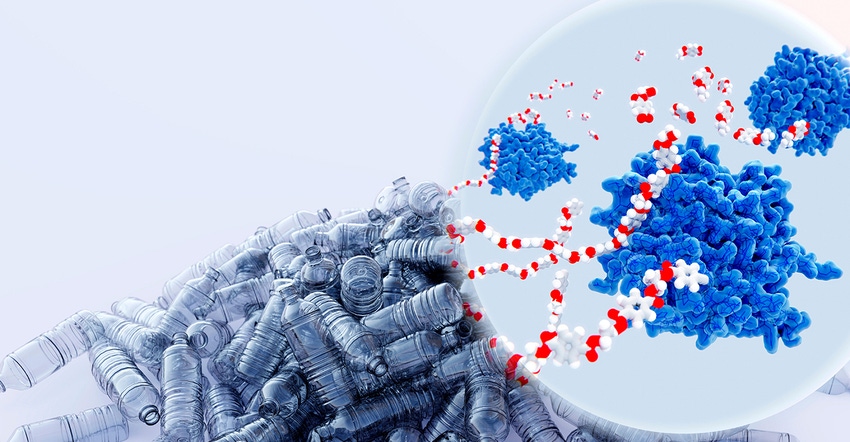Enzyme Breaks Down Waste Plastic in Days, or Even Hours
The plastics-eating enzyme almost completely degrades untreated, postconsumer-PET from 51 different thermoformed products in a week, say researchers.
May 5, 2022

Why bury plastic in a landfill and wait years for it to degrade when it can break down in days — or even hours?
That’s what researchers at the University of Texas at Austin propose in their study of a plastics-eating enzyme. The paper was published on April 27 in the journal Nature.
Their variant of an enzyme called PETase can degrade PET even at low temperatures, making the process even greener by reducing energy usage. By creating a machine learning algorithm, the team was able to engineer its mutated version of PETase, called FAST, which stands for functional, active, stable, and tolerant.
According to the paper, PET accounts for 12% of global solid waste. FAST-PETase has the potential to take a big bite out of that volume. The study found that the plastics-eating enzyme could:
Almost completely degrade untreated, postconsumer-PET from 51 different thermoformed products in a week.
Depolymerize all of a thermally pretreated water bottle at 50°C, or untreated amorphous portions of a water bottle.
Furthermore, the team demonstrated that PET could be resynthesized from monomers recovered after using FAST-PETase. In some cases, those monomers were generated within 24 hours.
“The possibilities are endless across industries to leverage this leading-edge recycling process,” said Hal Alper, professor in the McKetta Department of Chemical Engineering at UT Austin, in a press release from the university. “Beyond the obvious waste management industry, this also provides corporations from every sector the opportunity to take a lead in recycling their products. Through these more sustainable enzyme approaches, we can begin to envision a true circular plastics economy.”
With less than 10% of plastic waste around the world being recycled, biological solutions that function at low temperatures offer a portable and less energy-intensive alternative either to burning plastic at high temperatures or employing conversion processes like glycolysis, pyrolysis, or methanolysis. FAST-PETase could be used for environmental remediation of plastics-polluted sites.
“When considering environmental cleanup applications, you need an enzyme that can work in the environment at ambient temperature,” Alper said. “This requirement is where our tech has a huge advantage in the future.”
To further explore the potential of FAST-PETase, the UT Austin researchers plan to scale up production of the enzyme and find opportunities to use it in the field — for example, at landfills or industrial sites that produce high amounts of waste.
About the Author(s)
You May Also Like


